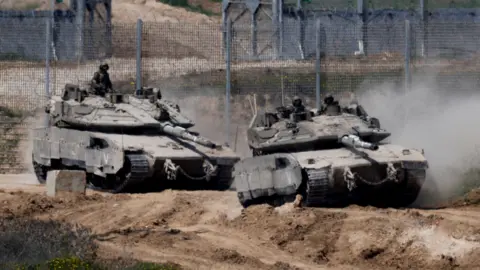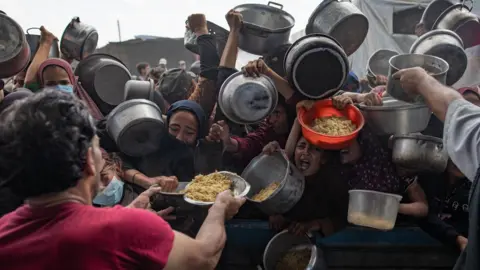Israel security cabinet approves plan to 'capture' Gaza, official says
 Reuters
ReutersIsrael's security cabinet has approved a plan to expand its military offensive against Hamas which includes the "capture" of Gaza and the holding of its territory, according to an Israeli official.
It is also said to include moving the 2.1 million Palestinians in Gaza towards the south, which could worsen the humanitarian crisis.
Prime Minister Benjamin Netanyahu called it a "good plan" because it would achieve the goals of defeating Hamas and returning its remaining hostages, the official said.
The cabinet also approved, in principle, a plan to deliver and distribute humanitarian aid through private companies, which would end a two-month blockade the UN says has caused severe food shortages.
The UN and other aid agencies have said the proposal would be a breach of basic humanitarian principles and that they will not co-operate.
Hamas said Israel's proposal amounted to "political blackmail".
Prime Minister Benjamin Netanyahu's security cabinet met on Sunday evening to discuss the Gaza offensive, which resumed when Israel ended a two-month ceasefire on 18 March.
An Israeli official who briefed the media on Monday said that ministers voted unanimously to approve a plan proposed by the Israeli military's Chief of Staff Lt Gen Eyal Zamir to "defeat Hamas in Gaza and return the hostages".
"The plan will include, among other things, the capture of the Strip and holding the territories, moving the Gazan population south for its defence, denying Hamas the ability to distribute humanitarian supplies, and powerful attacks against Hamas," the official said.
Israeli media reported that the plan would take months and that the first stage included the seizure of additional areas of Gaza and the expansion of the Israeli-designated "buffer zone" running along the territory's borders. It would aim to give Israel additional leverage in negotiations with Hamas on a new ceasefire and hostage release deal.
Security cabinet member Zeev Elkin told public broadcaster Kan that there was "still a window of opportunity" for a new hostage release before the end of President Trump's 13-16 May trip to the Middle East "if Hamas understands we are serious".
During a visit to a naval base on Sunday, Lt Gen Zamir told special forces that tens of thousands of reservists were being called up "in order to strengthen and expand our operations in Gaza".
"We are increasing the pressure with the aim of bringing our people home and defeating Hamas. We will operate in additional areas and destroy all terrorist infrastructure - above and below ground," he said.
However, critics say this is a failed strategy, as none of the 59 remaining hostages has been freed since the offensive resumed six weeks ago.
The Hostages and Missing Families Forum, which represents hostages' relatives, said the plan was an admission by the government that it was "choosing territories over the hostages" and that this was "against the will of over 70% of the people" in Israel.
 EPA
EPAThe Israeli official said the security cabinet also approved by a large majority "the possibility of humanitarian distribution - if necessary - that would prevent Hamas from taking control of supplies and would destroy its governmental capabilities".
On Sunday, the Humanitarian Country Team (HCT), a forum that includes UN agencies, said Israeli officials were seeking to "shut down the existing aid distribution system" and "have us agree to deliver supplies through Israeli hubs under conditions set by the Israeli military, once the government agrees to re-open crossings".
The HCT warned that the plan would mean large parts of Gaza, including less mobile and most vulnerable people, would continue to go without supplies.
"It contravenes fundamental humanitarian principles and appears designed to reinforce control over life-sustaining items as a pressure tactic – as part of a military strategy," it said.
"It is dangerous, driving civilians into militarized zones to collect rations, threatening lives, including those of humanitarian workers, while further entrenching forced displacement."
Israel cut off all deliveries of humanitarian aid and other supplies to Gaza aid on 2 March, two weeks before resuming its offensive.
According to the UN, the population is facing a renewed risk of hunger and malnutrition because warehouses are empty, bakeries have shut, and community kitchens are days away from running out of supplies.
The blockade has also cut off essential medicines, vaccines and medical equipment needed by Gaza's overwhelmed healthcare system.
The UN says Israel is obliged under international law to ensure supplies for Gaza's population, almost all of whom have been displaced. Israel says it is complying with international law and there is no shortage of aid.
The Israeli military launched a campaign to destroy Hamas in response to an unprecedented cross-border attack on 7 October 2023, in which about 1,200 people were killed and 251 others were taken hostage.
At least 52,567 people have been killed in Gaza since then, including 2,459 since the Israeli offensive resumed, according to the territory's Hamas-run health ministry.
